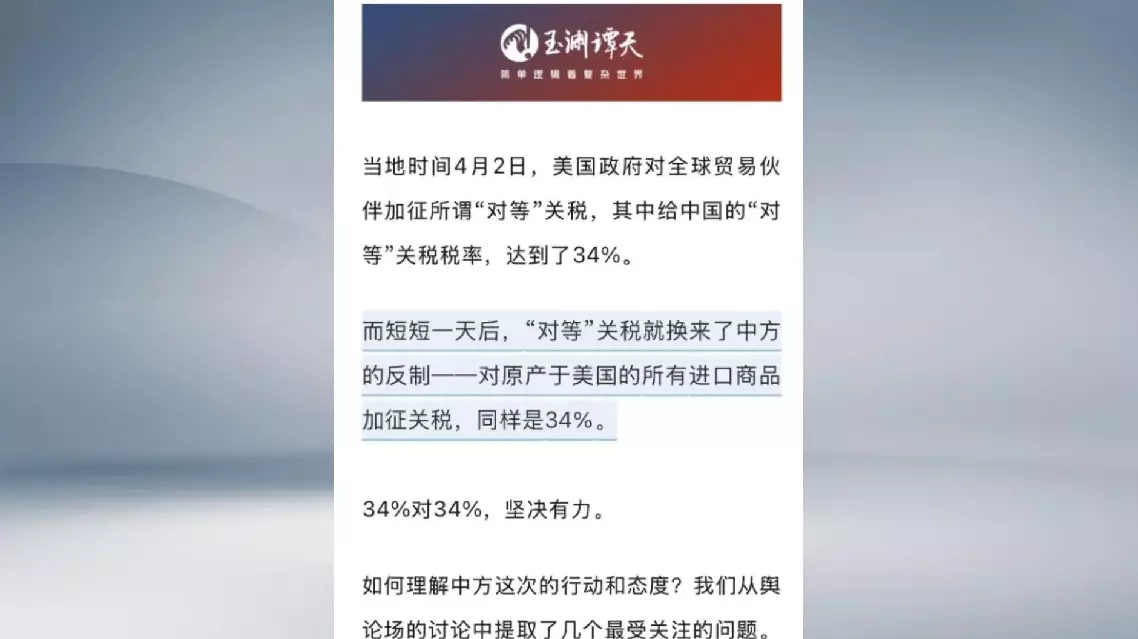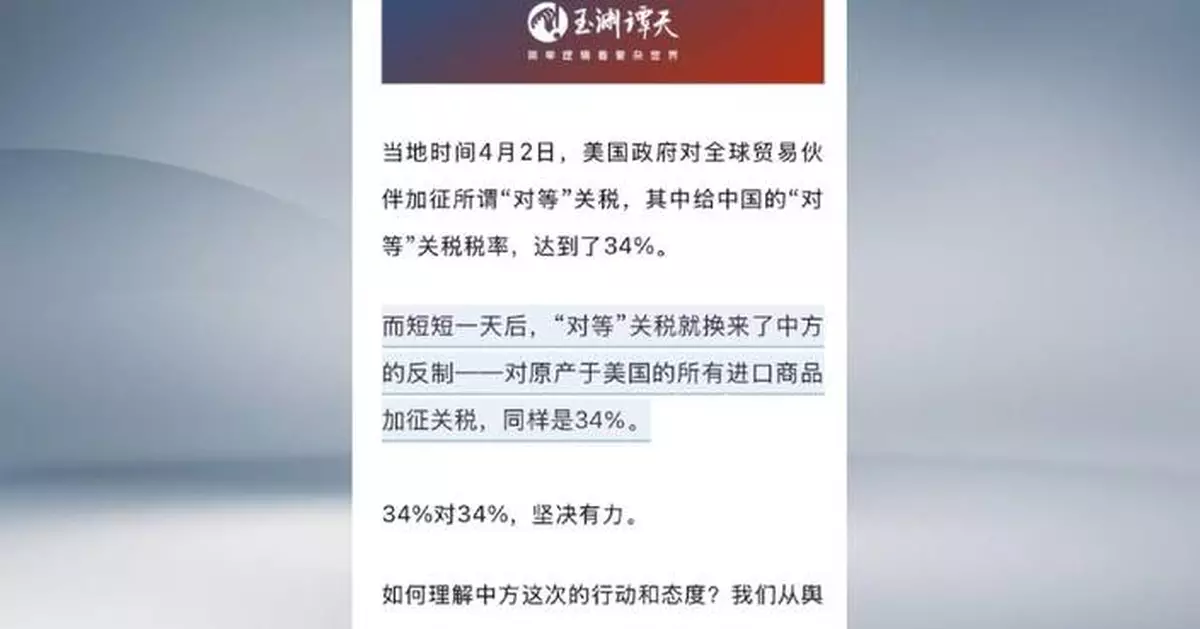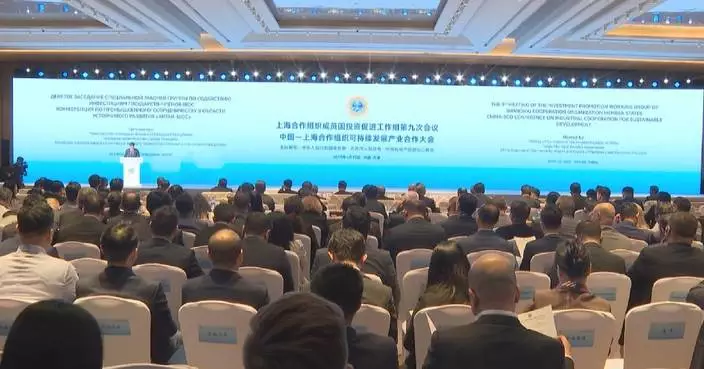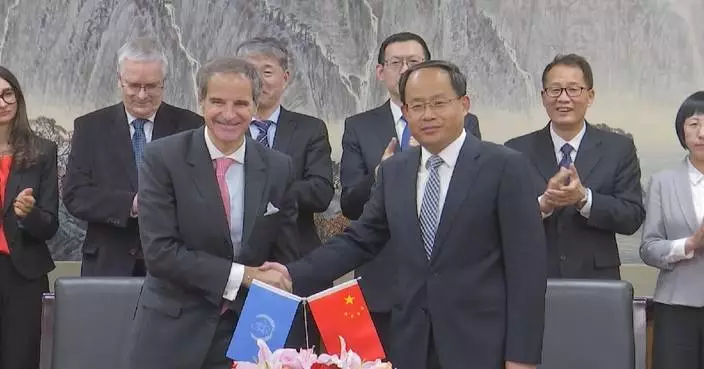China has taken the lead worldwide in hitting back the so-called "reciprocal tariffs" by the U.S. on its trading partners, demonstrating China's determination to safeguard its rights and interests, according to a commentary by Yuyuan Tantian, a media outlet affiliated with China Media Group (CMG), published on Saturday.
An edited English-language version of the commentary is as follows:
China's Customs Tariff Commission of the State Council announced Friday that the country will impose additional 34-percent tariffs on all products imported from the United States starting from April 10.
The announcement follows the U.S. decision to impose "reciprocal tariffs" on Chinese exports to the United States on Wednesday.
Why have China's countermeasures come so swiftly and decisively?
Firstly, due to eight years of continued trade frictions with the U.S., China had already been restructuring its import demand for American goods.
Take soybeans as an example. Before the China-U.S. trade frictions began in 2018, the United States was China's largest soybean supplier, accounting for 34.4 percent of China's total imports.
However, the proportion dropped sharply then, with South American countries like Brazil turning into the main sources of China's soybean imports.
Meanwhile, China, with improved reserve system, has produced over 20 million tons of soybeans annually for three consecutive years since 2022, thus further reducing the country's dependence on imports.
Second, China's efforts to promote the "dual circulation" of markets both internally and internationally have provided companies with more diverse market choices.
In 2024, China's imports and exports to countries participating in the Belt and Road Initiative grew by 6.4 percent, taking up 50.3 percent of the total foreign trade. In breakdown, the growth rates of trade with Latin America, Africa, the five Central Asian countries, as well as Central and Eastern Europe stood at 7.2 percent, 6.1 percent, 7.2 percent, and 7.5 percent, respectively. In addition, emerging markets, including ASEAN countries, have contributed nearly 60 percent to China's foreign trade market.
At the same time, China is also continuing to help local foreign trade enterprises to expand their domestic sales channels.
These diverse channels at home and abroad are conducive to helping Chinese firms cope with the impacts of U.S. trade policy, which is one of the reasons why China has remained calm in its handling the trade war.
Following the U.S. move to slap "reciprocal tariffs" on all its trading partners, many nations have expressed their intention to take countermeasures, including the European Union (EU), Japan, South Korea, India and ASEAN countries.
In particular, the EU has issued warnings one after another, saying that it has prepared a set of countermeasures against the United States, not just limited to imposing tariffs.
After receiving these warnings for countermeasures, U.S. Treasury Secretary Scott Bessent said in an interview with Bloomberg, "I wouldn't try to retaliate. As long as you don't retaliate, this is the high end of the number."
His remarks indicate a U.S. negotiation strategy that begins with an excessive gambit so as to leave room for later concessions.
In other words, the tariffs aim to win leverage over U.S. trade partners by creating enough pressure to force the other parties to give in.
If any country subject to the tariffs shows any sign of hesitation or compromise in exchange for tariff reductions, they leave the door open to allow the U.S. to exert more pressure.
The move taken by the U.S. does not conform to international trade rules, represents a typical act of unilateral bullying, seriously undermines other nations' legitimate rights and interests, and jeopardizes global economic development and the stability of industrial and supply chains.
As the first nation in the world to roll out resolute and swift countermeasures against U.S. "reciprocal tariffs", China has sent a clear message to the world -- it will not hesitate to resolutely fight back against any unilateral bullying that violates international rules.
The U.S. should immediately lift its unilateral tariff measures and resolve trade disputes through consultations on the basis of equality, respect and mutual benefits.
Tariffs will not crush China and other countries. It is the United States that will be the one to pay the heaviest price.

China shows firm resolve in striking back on US "reciprocal tariffs": commentary




















































